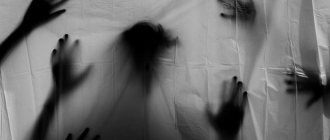A nightmare is a sleep disorder that can affect a person at any age. This condition is not a disease, is not inherited and has nothing to do with genetics.
According to statistics, all children under the age of 7 have experienced at least one nightmare. In most cases, night terrors occur in children aged 3-5 years. Research has shown that nightmares during sleep are most common in boys, but by age 12 they go away on their own and do not require the help of a sleep specialist.
The difference between nightmares and fears
Night terrors should not be confused with nightmares. Many people consider these conditions to be similar, but in their manifestations these disorders are different. A nightmare is a disturbing, scary dream that causes a person to wake up in extreme fright.
Night terrors (parasomnia) occur before falling asleep or in a state of partial awakening of a sleeping person. They are accompanied by short, sharp movements of the upper extremities of the body, sometimes the legs, and you can hear a scream.
Another undoubted difference is that only children suffer from night terrors, in isolated cases adults. Both sexes of any age category are susceptible to nightmares; both small and large people can have terrible dreams.
In order to deal with problems, you need to know the differences in conditions. The help in each case will be different, different from others. And if, after the twelve-year mark, fears have not gone away, continue to haunt you with the same frequency and do not decrease, then you need to find out the reason for their occurrence as soon as possible.
Causes of nightmares in adults
Half of the adult population of the planet sometimes has nightmares at night, especially for the fairer sex. There are several factors that influence healthy sleep:
- Various stressful situations and shocks.
- Eat a large meal before bed.
- Fatigue caused by lack of sleep.
- Taking medications (side effects) or stopping them (if addictive).
- Alcohol intoxication.
- Depressive state.
- Increased body temperature, high fever and chills (with colds).
- Briefly holding your breath during sleep (apnea)
- Restless legs syndrome (pain that causes involuntary soothing movements during sleep, disrupting the natural sleep cycle).
Psychologists say that bad dreams are seen by people with an unstable psyche, emotionally unbalanced, easily wounded and creative people.
Post-traumatic stress
One of the main causes of incessant nightmares in adults is called post-traumatic shock. Difficult life situations lead to a stressful state, such as the death of loved ones, various disasters, life-threatening conditions, any injuries received and many other phenomena that are difficult to experience and leave strong emotional shocks.
After suffering a severe psychological impact on the body, the brain tries to cope with the situation that has arisen; to do this, it “replays” past events in a dream. So it helps to get rid of problems and accept a fait accompli, thereby maintaining physical and spiritual health.
Post-traumatic stress is often called “Afghan syndrome.” It is observed in many men who took part in military operations in Afghanistan. Often nightmares are one of the symptoms of this syndrome.
Lack of sleep, constant fatigue, daytime quarrels and scandals are also dangerous for the human psyche. Constant irritations at home and at work lead to emotional distress and the fear of bad dreams. For these reasons, adults are more likely than children to suffer from such disorders.
In case of prolonged regular nightmares that last for two weeks or more, it is necessary to urgently seek qualified help.
Panic attack in a dream
Panic attacks in sleep are a separate type of disorder that occurs at night, in silence. At this time, a person tends to concentrate his attention on certain actions and moments, often negative, that provoke an attack. Another cause of a panic attack during sleep can be a nightmare. Most often, anxiety and fear overtake a person between 24 and 4 hours.
The following symptoms are typical for a panic attack during sleep:
- awakening;
- fear, horror;
- a sharp jump in body temperature;
- respiratory spasms;
- violation of orientation in space;
- chills;
- the appearance of cold sweat;
- involuntary urination;
- nausea, diarrhea;
- short-term paralysis of part or all of the body.
As the severity of the attack decreases and awakening, traces of fear and horror gradually fade away, leaving behind confusion and anxiety.
Night attacks significantly undermine a person’s health, since insufficient rest provokes headaches, chronic fatigue, decreased concentration, nervousness, and irritability. Over time, insufficient rest becomes the cause of depressive disorders, and the regularity of panic attacks increases. This provokes the formation of phobias.
What kind of nightmares do you have?
Bad dreams come to a person who is in deep sleep (rapid phase), usually in the second half of the night, in the morning. This period is easy to recognize by the rapidly moving eyes of a sleeping person.
Categories of scary dreams include:
- Pursuit, flight from danger.
- Fear of heights, falling.
- Serious illnesses, death of one’s own or of friends and relatives.
- Natural disasters and destruction.
- Mystical creatures, paranormal phenomena.
- A tragedy or terrible event experienced in real life.
The nightmare of losing loved ones is a fairly common type of nightly dream.
After such dreams, a person cannot sleep, feels weak, tired, unwell, and is haunted by daytime sleepiness and mild attacks of depression. All these symptoms worsen the quality of life. But they disappear after a sound and restful sleep.
If nightmares are regular, then serious diseases and disorders of the body are added to the above symptoms:
- Severe depressive state.
- Diseases of the cardiovascular system.
- Excess weight to obesity.
How to fight?
To solve the problem, you first need to find out the cause of scary dreams and eliminate it:
Why does a child cry at night?
- Review your evening diet. If nightmares are associated with overeating, eating fatty, high-calorie foods before bedtime, then this reason can be easily eliminated; you just need to change the habit. You should eat light food 2-3 hours before bedtime and do not overeat.
- Eliminate lack of sleep. To do this, you need to reconsider your daily routine and adjust your work schedule.
- High body temperature with a cold. To alleviate the condition, you need to take a fever-reducing medication.
- Get rid of bad habits and taking medications.
If you reduce or stop taking substances that disrupt brain function, the quality of sleep will improve after a while. Alcohol withdrawal syndrome goes away 5-7 days after the last intake of alcoholic beverages, if they are abused. Antidepressants are discontinued by slowly reducing the dosage of the drugs under the guidance of a physician. Self-medication can lead to irreversible consequences.
Reduce stress and cure depression
Relatives and relatives of a person suffering from depressive disorders should treat him with understanding, support him in every possible way, and give advice to seek help from a doctor, since many people suffering from depression do not understand their condition.
Against the background of a mental disorder, frequent nightmares often occur, which lead to thoughts of suicide. Depression is treated by specialists in the field of psychotherapy and psychiatry.
Eliminate diseases that interfere with sleep
A sleep specialist can help you cope with restless legs syndrome and other sleep disorders. An otolaryngologist will consult to relieve the patient of apnea.
Take a different look at your lifestyle
In order to develop such a useful quality as a stress-resistant psyche, you need to change your lifestyle, thinking and behavior. Mental health is the key to restful, sound sleep without nightmares. People who suffer from nightmares due to fatigue and stress often benefit from:
- Orderly sleep and wakefulness.
- Comfort in the sleeping area (the room should be ventilated, dark, and quiet).
- Rejection of bad habits.
- Physical activity during the day.
- Relief from stress and problems.
If a person is unable to cope with psychological difficulties upon waking up, it is necessary to consult a doctor who will help solve the problems. Having seen a nightmare, a person is in a state of emotional discomfort. There are several ways to wake up and cope with the unpleasant sensations left after such a night's rest:
- Describe your dream in words on paper.
- Draw a drawing of your dream,
- Invent a happy ending
- Tell someone close to you.
Some simple actions will help you calm down and relax after a difficult dream. You can turn on calm music, drink a glass of water, take a shower.
Conclusion
Panic attacks are often unreasonable fear and anxiety that arise under the influence of some traumatic factor on a person. The attack itself is not dangerous, but against the backdrop of uncontrollable fear, a person can commit rash acts, and frequent disorders disrupt his life. A constant feeling of fear and anxiety leads to insomnia, refusal to eat, severe exhaustion and exacerbation of chronic diseases. Panic attacks need to be treated and can be eliminated with psychotherapy, medication and lifestyle changes.
How do children experience anxiety attacks at night?
Due to the dysfunction of several areas of the brain, children experience attacks of night fears and nightmares. Typically, the appearance of fear occurs in children aged three to five years during the deep sleep phase, immediately after falling asleep, or during the first hour.
An adult can understand exactly what is happening to a child by the position of his body. When a baby has a bad dream, the body reflexively changes position, sometimes the child may jump out of bed, sit on it, or be tense and elongated. At the same time, he may scream or cry loudly.
Sleep disturbances may be accompanied by minor symptoms or in the form of parasomnia
Consequences
Panic attacks significantly worsen a person’s quality of life and, if left untreated, can cause the following complications:
- self-isolation, fear of society, interruption of contacts with other people;
- decreased self-esteem;
- loss of confidence in the future;
- wariness, anxiety, which can provoke aggression towards the environment;
- sexual dysfunction;
- the formation of mental disorders with frequent repetition of attacks;
- conflicts in the family;
- problems at work, study;
- abuse of alcohol and drugs to combat panic;
- exacerbation of chronic diseases;
- disorders of the digestive tract, dystrophy due to refusal to eat due to anxiety;
- fear of death.
What are childhood nightmares?
Night terrors in children, like nightmares, are not fiction or a figment of fantasy. Nightmares manifest themselves in the form of terrible hallucinations of physiological origin. If the child’s brain is overexcited and does not enter the inhibition stage, then a state of increased mental excitability occurs.
A third of all children suffering from this disorder exhibit high levels of movement activity during sleep. They twitch and wave their arms and legs, get out of bed, walk, and in some cases run away. Everything happens involuntarily; when they wake up, the children do not remember about it. Therefore, they must be protected from unexpected injuries.
Sometimes nightmares can develop into a pathological disorder such as sleepwalking or parasomnia.
Nightmares occur due to the imperfection of the child’s central nervous system. But sometimes they can indicate the presence of certain pathologies. Sleep disturbance can occur as a result of various stressful situations for the child, for example, severe fear, changes in the daily routine, etc.
A full bladder can also trigger night terrors. There are many reasons for the disorder, ranging from uncoordinated physical and mental development to serious diseases of some internal organs.
We should not forget that nightmares can be caused by the development of a mental disorder. A competent specialist will help determine the cause, he will prescribe the correct treatment and undergo rehabilitation.
In what cases should you consult a doctor?
More often than not, night terrors and nightmares pass without a trace and do not cause a feeling of great discomfort. But in some cases you should contact specialists. The following child conditions require mandatory consultation with doctors:
- The sleep disorder occurs more than once a week.
- The sleep disorder does not go away for half an hour or more and continues after the baby wakes up.
- Sleepwalking, during which the child puts himself in danger.
- If the sleep disorder is accompanied by salivation, body tension and convulsive muscle movements.
- When the disorder begins not in the first sleep cycle, but in subsequent periods.
- If a child remembers his night fears and is scared during the day.
Adviсe
How parents should behave depends on many factors. First of all, you need to find out what kind of childhood night terrors torment the little person.
It is important to ask the child what kind of night terror haunts him, who the main characters are in it. You need to calm the child down, show that adults are always with him, they are ready to help at any moment.
It is worth explaining to the child that there are no monsters in reality. Parents don't buy the toy they want - the children get upset. This situation may haunt them in their dreams. Here you just need to minimize the amount of stress during the day and sort out the difficulties.
Adults are advised not to watch scary movies or cartoons with their children, not to read scary fairy tales, and not to turn on the news before bed. This information is alarming.
If necessary, you can leave a night light or the door ajar. The child's night terrors will not go away quickly, but he will be able to calm down as soon as possible. It is important for a little person to realize that there is no threat to his life.
There is no need to overload your baby with circles and sections. Due to his age, he needs a lot of time for games and entertainment, this is how he explores the world and learns.
You can buy your child a dream catcher and tell him about its purpose. Experts also recommend using amulets that have protective properties. It is necessary to monitor your child’s sleep patterns; it is important that sleep is adjusted. It’s good if the baby has the opportunity to sleep during the day and relax in the car during a trip to kindergarten.
A quiet and comfortable environment helps to get rid of children's night fears. There is no need to disturb the child while he is sleeping. It is forbidden to make loud volumes on the radio and TV; all noisy household appliances must be turned off. Ideally, adults should talk to each other in a low voice or whisper at night.
Showing concern for your child, devoting more time to him, listening to your child’s problems is another way to overcome children’s night terrors.










